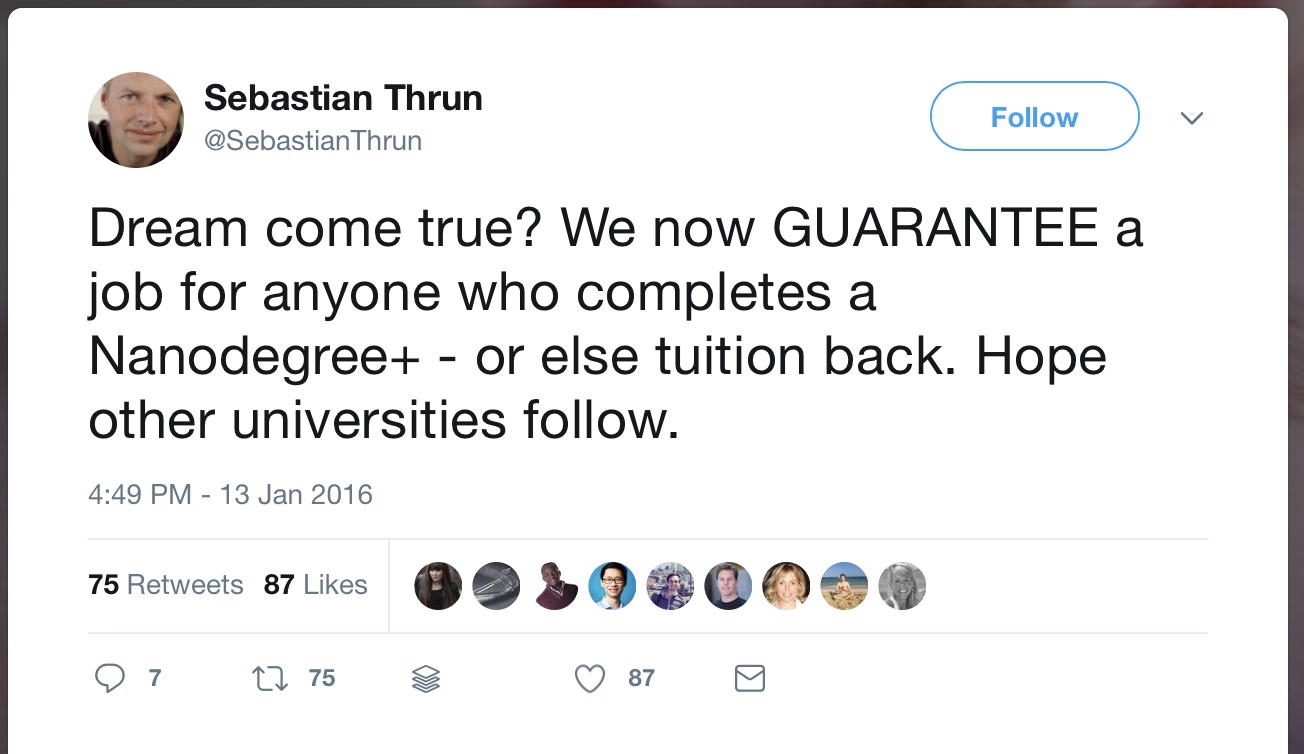In order to address the growing public concern about the value of arts degrees the (unpronounceable) DePauw University has begun to offer what it calls its ‘gold commitment’ to graduates who do not have an “entry-level professional position” or acceptance to graduate school within six months of graduation.
This means DePauw will either arrange a full-time entry-level position for at least six months or the university will give the graduate another semester of education free from tuition fees. The offer is subject to conditions though: the student must meet a set of academic, behavioural and other requirements to qualify.

Others do this too…
Capitol Technology University guarantees that if a student graduates with a qualified bachelor’s degree, they will find a position in engineering, engineering technology, computer sciences, information technology or business within 90 days of graduation. If they don’t, Capitol will provide up to 36 additional undergraduate credits — tuition-free — while they continue their job search.
Davenport University offers a commitment too provided that students meet a long list of academic and other requirements. For students who have achieved these standards and are not employed within six months of graduation the University will offer the following based on an assessment of student need:
- Evaluation of student development areas and creation of an action plan to address those areas.
- up to a maximum of 48 credits (a value of $32,000 based upon 2016 tuition rates) and does not include the cost of textbooks, course fees, residence hall or living accommodations, or fees for taking certification tests.
- Continued engagement in on-campus and off-campus recruiting opportunities relative to the student’s professional area.
According to Inside HigherEd Thomas College has had its Guaranteed Job Program since 1999:
If a student is unemployed six months after graduation, the college will make monthly payments on their federally subsidized student loans for up to a year, or they may enroll tuition-free in up to six evening graduate courses at Thomas. Students may also re-enroll at Thomas if they are in a job that isn’t in their field of study.
Mark McCoy, a former dean of DePauw’s music school and now University President, is pretty keen on the liberal arts:
“I want the world to be more liberally educated, and more people to consider this type of education, here and everywhere,” he says. But doubts about the liberal arts’ value impede that goal — not so much for students but for parents.
“Parents are legitimately concerned about the first job,” he says. “If we take that issue off the table for you, because we’re so sure it works, we think parents will go, ‘Now I can stop worrying about this, I can give them the best education available, which is the liberal arts education.'”
Focusing on students’ postgraduation outcomes isn’t new for DePauw — it has long focused on experiential learning and has had a center for entrepreneurship for nearly 40 years. But it will as part of the Gold Commitment become more intentional in what it offers (and demands of) students.
This is all good to hear, especially in the arts. But there is an argument that this is all perhaps a little gimmicky.
Still, these universities couldn’t possibly be as gimmick-prone as the higher ed disruptors such as Udacity, could they?

It was hailed as a “dream come true” by Udacity’s founder and CEO Sebastian Thrun.
“We now GUARANTEE a job for anyone who completes a Nanodegree Plus — or else tuition back. Hope other universities follow,” tweeted Thrun in January 2016.
Now, it seems, the dream is over.
Udacity has quietly scrapped its pledge, nixing the program, which guaranteed a job within six months of graduation or 100 percent of students’ money back, at the end of last year.
Announced with much fanfare, the job guarantee applied to Udacity’s Nanodegree Plus program, an enhanced version of the nanodegree with access to a career adviser and career concierge services.
So much for that particular innovation then. This news item also quotes a report which suggests that of 10,000 students who had earned ‘nano degrees’ since 2014 only 1 in 10 had found jobs as a result.
With success rates like that Udacity will really struggle to break the mould in future. Let’s hope others don’t follow this model otherwise future graduate employment is looking pretty shaky…














Not unheard of here – BPP have offered similar for a number of years ( https://l2b.thelawyer.com/issues/l2b-online/bpp-to-offer-unemployed-graduates-free-courses/ | http://www.bpp.com/bpp-university/terms/career-guarantee ) and The College of Law offer “100% fee refund if unemployed after nine months” on some postgraduate courses.